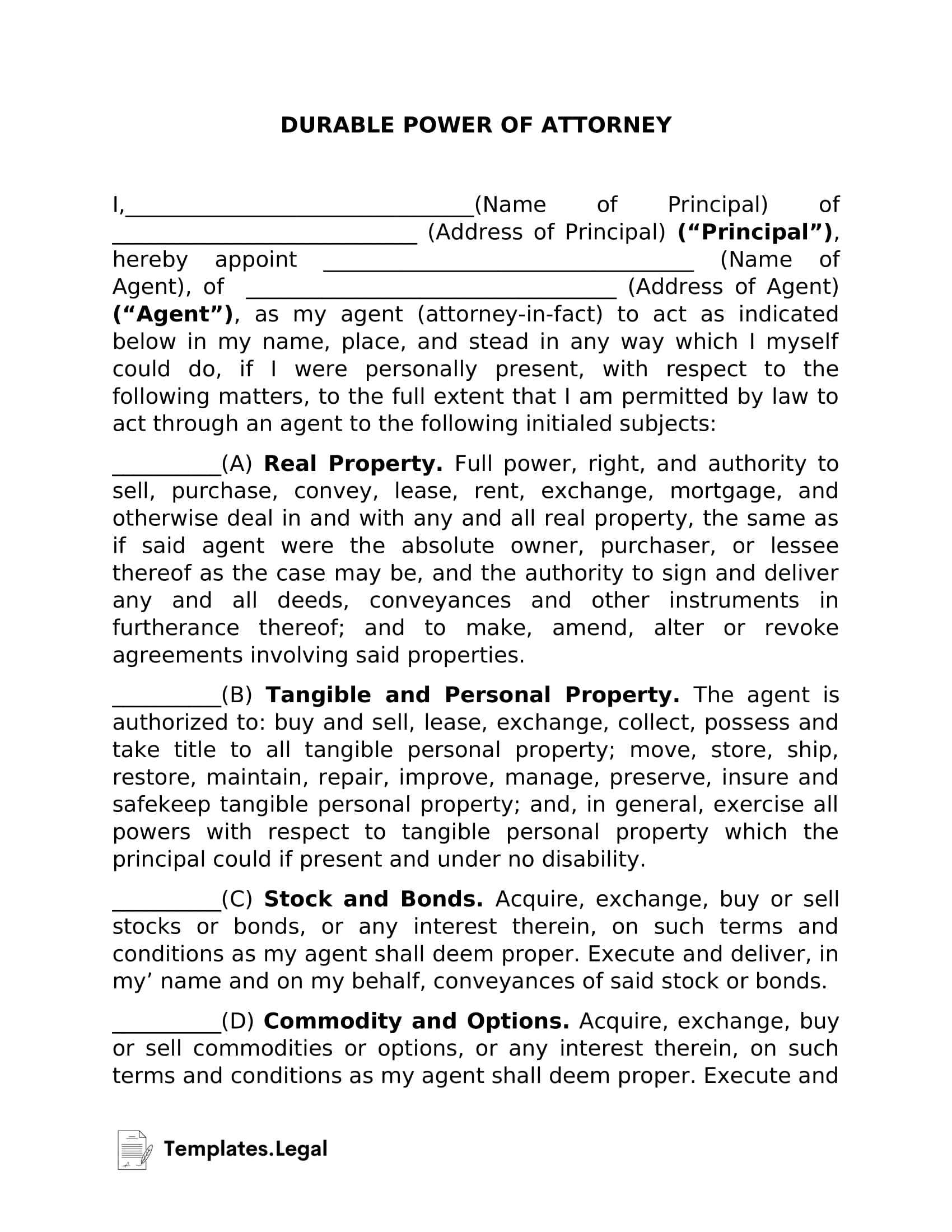
A durable power of attorney is a legal document established to protect a person in the event of a medical emergency. This specific type of document authorizes a chosen individual (the agent) to make financial, medical, and legal decisions for you (the principal).
Contents hideIf you become unable to communicate due to injury or illness, a durable power of attorney remains in place. If a power of attorney is not deemed durable and you become incapacitated, it will cease to be in effect.

Before you begin the process, be sure you have someone you can trust. This person will be your agent and they will act on your behalf. Make sure this person has your best interests at heart. Having someone you trust makes this process that much easier.
Here are some answers to the most frequently asked questions when it comes to durable power of attorney.
What’s the Difference between a General Power of Attorney and a Durable Power of Attorney?In general terms, a power of attorney is a legal, written document where you (the principal) authorize someone you trust (the agent) to act on your behalf. You decide how much and what type of authority to grant your agent. This then gets outlined in the legal document.
In a general power of attorney, the agent’s authority begins when the principal executes the document. That authority ends if it is terminated by the principal or if the principal falls to illness or injury and cannot communicate.
A durable power of attorney also begins immediately after the principal signs the document into effect. However, when a power of attorney is deemed durable, it remains effective through any illness or injury incapacitating the principal.
An agent with durable power of attorney will be able to carry on with your affairs if you fall to illness or injury and are unable to communicate.
Why Would I Need a Durable Power of Attorney?Certain circumstances may bring about the need for a durable power of attorney (DPOA).
A soldier may want a DPOA before they are deported overseas. Young folks who often travel away from home or people involved in high-risk hobbies or extreme sports may decide to set up a DPOA.
For the most part, a DPOA is typically established by families when a loved one is facing a severe and long-term health crisis.
A durable power of attorney authorizes an individual of your choosing to act on your behalf – and it covers circumstances where you may become unable to make your own decisions and take care of your affairs or estate.
This arrangement is different from the general powers of attorney, which ceases automatically should you lose your life or mental capabilities.
If you become incapacitated, your agent will be called upon to ensure your well-being and care under a durable power of attorney. Your agent will have the authorization to pay your bills, manage your properties, handle your affairs and ensure your medical needs are met.
If a durable power of attorney is not in place and the unfortunate happens, family and friends may take to the courts to sort out who will handle your finances and affairs.
Can I Revoke a Durable Power of Attorney?Yes, if you are mentally competent and of sound mind, you can revoke a durable power of attorney.
If you are incapacitated, laws exist that aid and protect the individuals who have granted power of attorney. If an agent moves away, is no longer able to efficiently manage the principal’s affairs, or is perhaps not acting in the principal’s best interest, a judge can terminate a durable power of attorney. It is a court process that will require a qualified family law lawyer – but it can be done.
How Do I Sign as a Durable Power of Attorney?Failing to identify that you’re signing on your principal’s behalf can lead to invalidities or even civil or criminal lawsuits. Make sure you are signing all documents correctly.
The standard format to sign as power of attorney is to first write the principal’s full and legal name. This shows you are acting on their behalf, not yours.
Under the principal’s name, sign your name – but add the word “by” in front of your name. This helps to indicate you’re signing as power of attorney.
Below your name, write “attorney-in-fact.” Other acceptable variations also include “POA” or “power of attorney.”
A standard signature would be formatted like this:
Power of attorney
Some institutions will have their own signing format you may have to follow. Always be sure you are filing every document in a safe and secure place. It’s also essential to follow the directions you’ve been given as the agent and maintain a clear record of your actions.